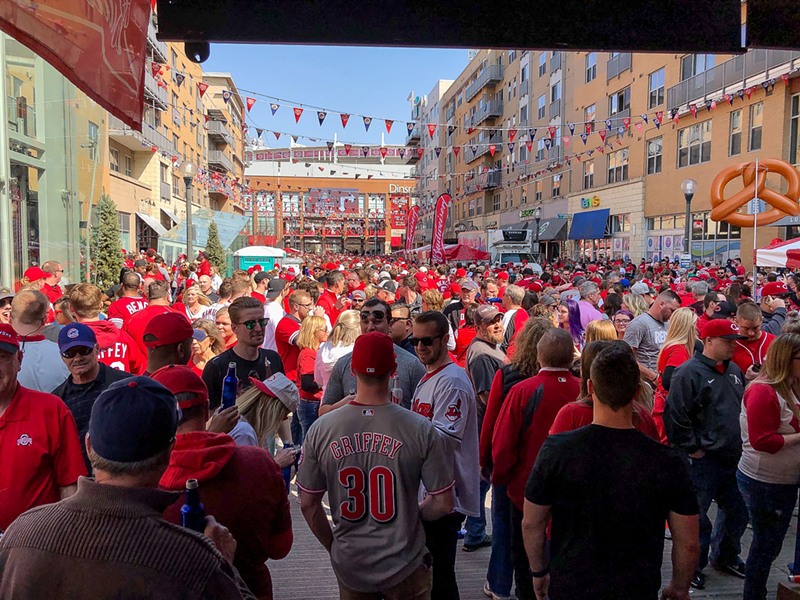
By now, you've likely heard a million things about COVID-19 — a new virus that started in Wuhan, China late last year and has swept across the globe since. The virus has sickened more than 118,000 people across the globe and killed almost 4,300 at a minimum, the World Health Organization reported March 11.
To date, health officials have confirmed five cases of the virus in Ohio, though Ohio Health Director Amy Acton estimates there may be more than 100,000 people in the state with the virus undiagnosed. At this point, there have been no confirmed cases in Hamilton County — but experts say that will very likely change soon.
That has triggered the cancellation of a number of beloved Cincinnati traditions, including the Findlay Market Opening Day Parade, the Saint Patrick's Day Parade and other large gatherings. (We're keeping track of cancelations and other announcements here.)
More cancellations or suspensions are likely. Cincinnati Mayor John Cranley yesterday declared a state of emergency, which would make it easier for the city to cancel other events, restrict travel and take other measures to slow the spread of the virus.
With no confirmed cases in Hamilton County, some are asking — why cancel everything? The answer is that a big surge of COVID-19 could very well be coming.
Those cancellations and personal behaviors like washing your hands, avoiding close proximity to others and staying home if you're feeling sick are important not because they will necessarily outright stop the spread of the disease, experts say, but because they could slow it down if and when it arrives in Hamilton County.
That could keep its spread from overwhelming hospitals, making large parts of the workforce sick all at once and endangering very vulnerable parts of the population.
Here's an elegant GIF that illustrates that vital concept.
One of the best graphics I’ve seen to help understand the science behind the decisions being made. Learn more at https://t.co/7aC9IiRJgX #COVID19 pic.twitter.com/8uaHpYaq3K
— Lydia Mihalik (@LydiaMihalik) March 11, 2020
If you're young and healthy, you will most likely not get very sick from the virus, at least going by how it has behaved so far. But robust preventative measures will protect those for whom the individual stakes are much higher.
Coronaviruses are a broad category of virus that cause the common cold, among other illnesses. COVID-19 is what scientists call a new, or "novel" form of the virus — one for which humans haven't developed antibodies and one which epidemiologists do not yet know how to combat.
UC Health's Dr. Dustin J. Calhoun told attendees at a March 10 city summit that 80 percent of people infected will experience a mild cold. The majority who experience more severe symptoms will also recover. At this early stage, pregnant women and children seem to be less vulnerable, Calhoun said.
Those most at risk are the elderly — mortality rates for those above 70 shoot up to 8 percent or higher, some studies suggest, while those under 40 have an estimated mortality rate of about .2 percent so far.
The takeaway — if you're healthy and under the age of 60, you shouldn't be too panicked about getting sick. But you should be very worried about the collective impact COVID-19 could have here.
The slower the virus spreads, the easier it will be to keep truly vulnerable people — those over the age of 60 or with chronic health problems — from catching it, and the more likely they'll be able to receive full-capacity, life-saving care at a hospital if they do.
In other places like China, Iran and Italy, where the northern portion of the country has been on a near-total lockdown, the number of cases of COVID-19 began doubling every six days shortly after it was detected. That exponential growth is how viruses operate — hence the term "going viral."
That incredibly rapid spread has caused all kinds of problems, even though not everyone gets very sick from the virus.
Ohio is still in the early stages of the virus' spread here. But there are troubling signs it could intensify soon.
The state's first three confirmed cases were in Cuyahoga County. Two of the folks infected there had been to a conference with someone with a confirmed case in Washington, D.C. The third came back from a cruise where other cases were confirmed.
But the state's fourth confirmed case is a man in Stark County who had not traveled any place with the virus or come in contact with someone confirmed to have COVID-19. That's what epidemiologists call "community spread" — a sign that transmission of the disease is picking up its pace.
Ohio Public Health Director Amy Acton called that case "a game changer."
Ohio Gov. Mike DeWine yesterday implored event organizers to cancel large gatherings and said a state order to do so is on the way.
Cincinnati Public School the Academy of World Languages was closed for two days after a staff member there self-quarantined because they were experiencing symptoms of illness. Janitorial staff worked to deep-clean the school's Evanston building while it was closed.
CPS subsequently curtailed in-person instruction at the district until at least April 3 — something the area's universities have also done per instructions from Ohio Gov. DeWine.
Expect the closures and suspensions to keep coming. Major League Soccer announced it was suspending its 2020 season for 30 days — just two days before FC Cincinnati's home opener.
City officials, too, are mulling bigger moves, with the aim of being more safe now than sorry later.
"We're going to take actions in next few days, next few weeks, hopefully not next few months that we hope people look back and say we were too reactionary," Cincinnati City Manager Patrick Duhaney said at the announcement of the city's state of emergency March 11.

